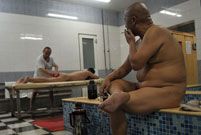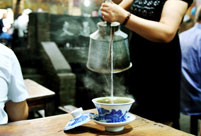 Opps! What a coincidence!
Opps! What a coincidence!
 Breathtaking scenery in Redstone Park in SW China
Breathtaking scenery in Redstone Park in SW China
 Vintage cars show kicks off in London
Vintage cars show kicks off in London
 Gorgeous scenery in NE China
Gorgeous scenery in NE China
 Picturesque Barkol grassland in Xinjiang
Picturesque Barkol grassland in Xinjiang
 Small Wild Goose Pagoda - A World Cultural Heritage Site along the Silk Road
Small Wild Goose Pagoda - A World Cultural Heritage Site along the Silk Road
 Maritime Silk Road Luxuries of the Han Dynasty
Maritime Silk Road Luxuries of the Han Dynasty
 Ciao! Chinese beauties!
Ciao! Chinese beauties!
 An eye feast: BFA freshmen registration
An eye feast: BFA freshmen registration
 Top 10 most lavish weddings
Top 10 most lavish weddings
In recent years the pressure doctors face has been a hot topic in China, with medical professionals having to cope with long work hours, low pay and tense doctor-patient relationships. As a result, some doctors are now choosing to quit or switch fields. In a society where medical resources are not equally distributed and medical services in short supply, the government must take steps to address the situation.
Zhang Hai has had a tough six months. He has been looking for another job, even though he has already worked as an oncologist for six years at the Jiangbei People's Hospital in Nanjing, Jiangsu Province.
Zhang isn't the only person having these kinds of thoughts. In China, the pressure on doctors has long been a hot topic: long hours, low pay, tension between patients and medical workers. But Zhang feels these issues are becoming more severe in recent years, particularly the last, with many conflicts escalating into open physical violence.
"My colleagues and I are constantly talking about this, especially since the media is more and more vocal about such attacks," he said. He is now thinking about finding an easier job with more pay and flexibility, preferably at a pharmaceutical company.
Statistics show he's not alone. Many of China's doctors are quitting the medical workforce. Experts call this a particularly dangerous trend, since it comes at a time when China's need for medical services is on the rise. In order to resolve this issue, the government has been advised to take steps to mend the relationship between patients and doctors.
Violent change
A search on baidu.com with the keywords "doctor" and "kill" or "hack" yields more than 12,000 results. Patients or their relatives, unhappy with a diagnosis, price, or treatment sometimes resort to violence. Some doctors are injured, while others have been killed.
One recent case was the death of a 27-year-old woman after a cesarean section at a hospital in Hunan Province on August 10, which triggered widespread discussion and concern.
The hospital said that the woman, surnamed Zhang, died as a result of an amniotic fluid embolism, which occurs when amniotic fluid enters the mother's bloodstream and triggers an allergic reaction, leading to kidney failure and sudden death. But the woman's relatives rushed into the operating room, apparently intent on committing violence. Media reports and the relatives' own account said that upon entering the room they found the woman dead and hospital staff inattentive.
The combination of such incidents and the pressure of being a doctor in the first place has led many to quit. But with a medical background, their other career options are limited, Zhang said.
"For people like us, we've been trained in this profession for so long, if we want to switch jobs, most people naturally choose to be a pharmaceutical sales representative or a teacher in a medical school," he said.
He entered the medical field because he thought he could make a difference, but now, six years later, he feels worn out by the intensity of work.
On June 11, the Chinese-language Journal of Medicine hosted a poll that asked "If you had another chance, would you choose to enter the medical field again?" A total of 937 medical workers participated in the poll, with 80 percent saying they wouldn't, while 94.56 percent said they won't let their children enter the medical field and 69.26 percent regretting that they became doctors.
Severe side effects
Despite the difficult situation facing medical workers right now, enthusiasm for medical schools remains high. The score needed this year in the national college entrance exam to get into the medical school at Fudan, a top-10 university based in Shanghai, was even higher than last year's, a sign of increasingly stiff competition.
Lu Hanyu, a medical student at Fudan, told the Global Times that most of his peers know the difficult conditions they will face when they enter medical school. Most of Fudan medical school's graduates make only 3,000 ($490) to 5,000 yuan a month when they start at hospitals, after five to eight years of study in a medical school.
Wang Ani, a counselor at Nanjing University's medical school, told the Global Times that medical students are not quitting en masse. She has seen five of her former students change jobs after several years working in the hospital.
"When the students are in medical school, the pressure they can feel comes from research and writing scientific papers," she said. "The pressure doctors receive is totally different."
But it's not only doctors feeling the pressure; patients are getting squeezed as well. Unsatisfied demand for medical services is growing rapidly in China.
The problem is especially severe in rural areas. According to statistics provided by medical reform expert Cai Jiangnan, in China's rural areas, there's an average of 1.3 doctors for every 1,000 people, while in the cities that number is three for every 1,000 people. At the same time, a recent survey of 86 rural hospitals by the Chinese Hospital Association found increasing caseloads and dwindling numbers of doctors.
A poll on Dingxiangyuan, China's popular online medical forum, shows that of those who change jobs, 37 percent choose non-medical fields and 27 percent choose to be sales representatives for pharmaceutical companies.
Liao Xinbo, the deputy director of the Department of Health of Guangdong Province, told the Life Times that it's a waste for doctors to quit and work in other jobs. The Life Times also quoted an insider in the pharmaceutical company in China as saying that it's rare for doctors to become sales representatives in other countries.
But for Chinese doctors, being a sales representative for a pharmaceutical company, especially a foreign one, can be an attractive option.
Being a doctor simply costs too much and pays too little.
Fixing the problem
The situation is changing though, Wang said. After the death of the pregnant woman in Hunan, a flurry of media reports sought to clear up rumors and misunderstandings.
Deng Liqiang, director of the legal affairs department of the Chinese Medical Doctor Association, told the Global Times that reports on half-truths or rumors have an enormous negative impact, and can damage already fragile doctor-patient relationships further.
The association has filed its first complaint with the All-China Journalists Association against a reporter with Southern Weekly, Chai Huiqun. Deng cited a story Chai published in 2010 about a nurse in Shenzhen, Guangdong Province, who allegedly sewed up the anus of a woman during labor because the nurse did not receive a good tip, saying the story was untrue.
"It's things like [this lawsuit] that give us doctors faith to go on," Zhang said. "I think we want understanding most of all, it's not about flexible hours or high pay. I knew I wouldn't get that much when I entered the profession, but I do think something can be done to ease tension."
He wants equal treatment, he said. Many patients nowadays seem to think as long as they pay, doctors should do whatever they ask. But, Zhang says, that's not how paying for medical services should work. Doctors are experts. He hopes the government can do more to ease tension between doctors and patients.
Liao told the Life Times that the attrition in medical workers will eventually lead to an underdeveloped medical system. To retain doctors, China needs to provide them with proper job opportunities, he said, adding also that the government needs to open more public hospitals with more advanced technology, boost pay to attract doctors, and continue working to change the perception of doctors.
Deng thinks the way to keep doctors is to start at the root and train elite doctors. He thinks people who enter the medical field should have graduated from medical universities, at least, and been properly trained at hospitals so they have the necessary professional expertise.
"Right now there are people who graduate from specialized secondary schools and go straight into the medical workforce, how can this be a good medical environment?" he asked. As a consequence, he calls for payment and freedom for these doctors that match their abilities.
 Jungle law: leopard preys on impala
Jungle law: leopard preys on impala Female bus driver drives Land Rover for commuting
Female bus driver drives Land Rover for commuting Top 3 iOS 8 features Chinese love most
Top 3 iOS 8 features Chinese love most Century-old public bath closes door in Beijing
Century-old public bath closes door in Beijing Teahouses in Chongqing: Worship to the leisure lifestyle
Teahouses in Chongqing: Worship to the leisure lifestyle Leading director Wang Quan'an detained for 'buying sex'
Leading director Wang Quan'an detained for 'buying sex' Mixed reaction to smartphone sidewalk
Mixed reaction to smartphone sidewalk Amazing aerial photos of China's Xisha Islands
Amazing aerial photos of China's Xisha Islands Top 10 world's highest-paid models 2014
Top 10 world's highest-paid models 2014 Lingerie show at 2014 Miss China
Lingerie show at 2014 Miss China Songstress Li Xianglan dies at 94
Songstress Li Xianglan dies at 94 Police recruiting posters
Police recruiting posters Anshun Daxi- Living fossil of Chinese drama
Anshun Daxi- Living fossil of Chinese drama Urban farmers in China
Urban farmers in China 'Firepower-2014 Weibei'military exercise
'Firepower-2014 Weibei'military exerciseDay|Week|Month